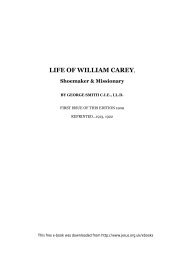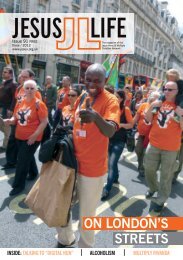Slaves of all - Jesus Army
Slaves of all - Jesus Army
Slaves of all - Jesus Army
Create successful ePaper yourself
Turn your PDF publications into a flip-book with our unique Google optimized e-Paper software.
Aidan and Alopen, Apostles<br />
Aidan was a fiery Irishman, Alopen a refined Persian. Both were monks,<br />
both gifted communicators. In AD635, both were, entirely independently,<br />
commissioned and sent to start churches: one at the North-West frontier <strong>of</strong><br />
civilisation, the other in the far East. Aidan became the Apostle <strong>of</strong> northern<br />
England, Alopen the Apostle to China. Despite their extraordinary linked<br />
destiny, they never met or even knew <strong>of</strong> each other. Article by Trevor Saxby<br />
Aidan: Apostle <strong>of</strong> the North<br />
BRITAIN AT THE turn <strong>of</strong> the 600s was a battleground<br />
<strong>of</strong> warring tribal kingdoms, most<br />
<strong>of</strong> them pagan. A Christian prince named<br />
Oswald was sent to the Celtic monastery on<br />
the Scottish island <strong>of</strong> Iona for his own safety.<br />
In 634 he felt ready to deliver his kingdom,<br />
Northumbria, in the north <strong>of</strong> England. He<br />
defeated the invaders and was crowned king.<br />
One <strong>of</strong> his first acts was to ask Iona to<br />
send someone to convert his pagan subjects.<br />
An envoy was sent but returned saying<br />
that the Northumbrians were obstinate<br />
barbarians, beyond redemption. At this, an<br />
Irish monk named Aidan spoke up: it was<br />
foolish to expect pagans to accept the strict<br />
rules <strong>of</strong> a Celtic monastery – they must be<br />
met on their own level, with grace and humility.<br />
For this, Aidan himself was appointed<br />
for the apostolic mission to re-evangelise<br />
the north <strong>of</strong> England. It was AD 635.<br />
Aidan established his base on Lindisfarne,<br />
an island <strong>of</strong>f the east coast, which became<br />
known as Holy Island. From here teams went<br />
out with the gospel, planting churches and<br />
establishing centres at Melrose, Jarrow and<br />
Whitby. By the time he died in 651, Northumbria<br />
was almost wholly evangelised.<br />
Aidan succeeded by developing key relationships<br />
with those who helped to expand<br />
the work and by wise and creative planning.<br />
He didn't do <strong>all</strong> the work himself – at<br />
first, he couldn't even speak the language<br />
but needed interpreters. He appointed and<br />
trusted many workers. Other noted Celtic<br />
saints, Hilda, Chad and Cuthbert, built up<br />
important ministries under his covering.<br />
But Aidan was a communicator. He could<br />
empathise. Any gifts he received from the<br />
wealthy, he gave to the poor. This included<br />
a fine st<strong>all</strong>ion given to him by the king. The<br />
king was furious, but Aidan replied: “Is the<br />
son <strong>of</strong> a mare more important to you than<br />
a son <strong>of</strong> God?” The humbled king knelt and<br />
asked forgiveness.<br />
Aidan's primary witness was through the<br />
genuineness <strong>of</strong> his life. He refused personal<br />
gain, showed no partiality (rebuking kings<br />
when they needed it), and practised rigorous<br />
self-denial. If the king came to Lindisfarne,<br />
he had to eat the same food as the<br />
monks and beggars. Aidan’s approach was<br />
“Do as I do”, not “Do as I say”, and because<br />
his life was open to <strong>all</strong>, people gladly followed<br />
and the Church was built.<br />
If the king<br />
came, he<br />
had to eat<br />
the same<br />
food as the<br />
monks and<br />
beggars<br />
<strong>Jesus</strong> Life Three/2007 Page 12<br />
www.jesus.org.uk
















